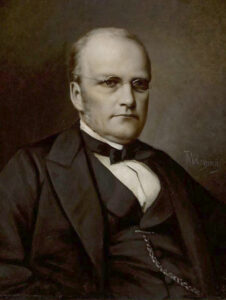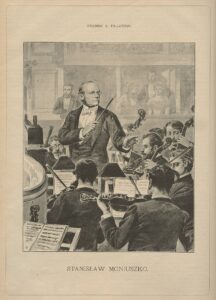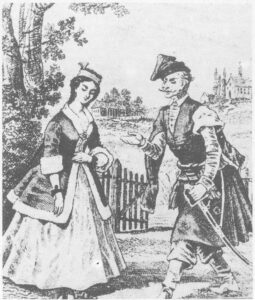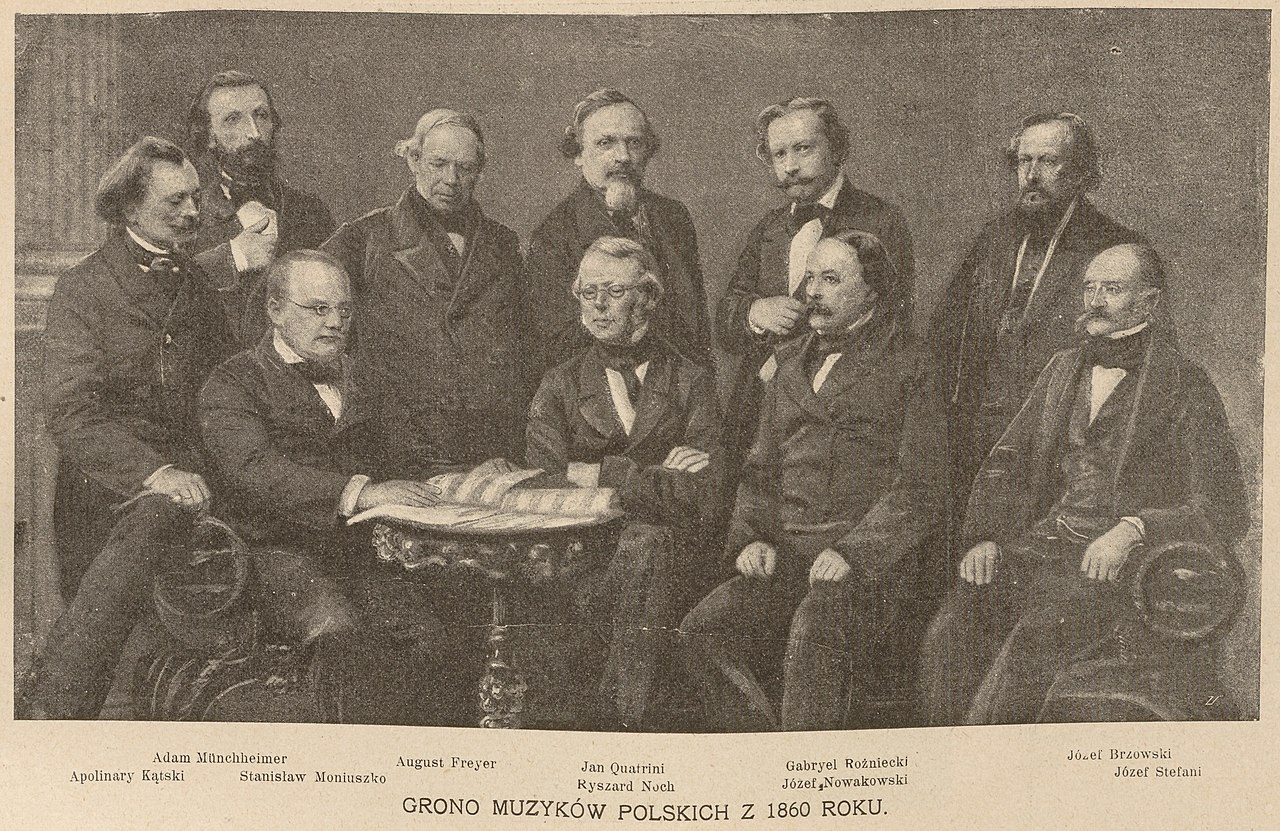Stanisław Moniuszko, one of Poland’s greatest composers, was born on 5 May 1819 in Ubiel in the Minsk province (currently Belarus). As a composer, he was well-known for incorporating elements of folklore and the works of national poets into his musical compositions. During his career, he wrote several hundred songs and church songs as well as operas, operettas and ballets.
by Piotr Bejrowski
Moniuszko came from a patriotic gentry family. In the family manor house, theater scenes were presented, folk songs were sung and the works of Julian Ursyn Niemcewicz recited. His mother, Elżbieta, taught young Stanisław to play the piano. Before the talented young man went to Berlin to study music, he studied in Warsaw, Minsk and Vilnius. Moniuszko returned to his homeland in 1840 and began working as an organist in the St. John Church in Vilnius. However, the most important source of income for the young musician was from the private music lessons he offered.

For several years, young Moniuszko had intended to write a more serious dramatic work. As he matured musically, he made contacts and tried his hand in various genres. During this time he struggled with financial problems as he had a fast growing family (eventually having up to ten children). Unfortunately, his first operettas (Lottery, Yellow Bathrobe) were not very successful. The breakthrough in his career came with the stage premiere of Halka. Work on the final version of the piece lasted over ten years. On 28 February 1854, Halka was staged in Vilnius in two acts. Next, after being expanded to four acts, it was staged on 1 January 1858 in Warsaw. This most famous Polish national opera tells the tragic story of a girl from Podhale who falls in love with a nobleman; at its core the opera illustrates the tensions between Poland’s social classes. This masterpiece also incorporated typical Polish dances – a Polonaise and a Mazurka – as well as numerous cultural elements from the mountains.
Art historians point out that the story presented in Halka was a commentary on the defeat of the Krakow Uprising that had broken out on 22 February 1846. The uprising was provoked by the Austrian authorities and was accompanied by a bloody revolt by the peasants against the nobility (the so-called Galician Slaughter). There were hopes that the whole nation would revolt against the invaders but these hopes quickly foundered, and the conflict between landowners and the peasantry only deepened.

After the opera’s success, Moniuszko became famous, and in November 1858, he moved with his family to Warsaw. No longer a simple church organist, he was now promoted to conductor of the Grand Theater. He had a large stage and professional ensemble at his disposal. During the Warsaw period, he wrote his most famous works of music – the operas Countess, Verbum Nobile, Straszny dwór and Paria, the cantata Crimean Sonnets and the ballad Pani Twardowska. He worked a great deal and at high speed, which did not always yield the desired artistic effect or success. Under the intensified Russian repression that followed the outbreak of the January Uprising, he constantly had to censor himself, even cancelling the well-received opera Straszny dwór (premiere: 28 September 1865) after only three performances. Ironically, the opera had been written in order “to encourage and hearten” people. During its construction, the composer once again reached for the rhythms characteristic of national dances and other ingredients of Polish folklore, and, in one of the arias – hidden among the lyrics of longing for a deceased mother – one could actually hear words of mourning for the fate of Moniuszko’s enslaved homeland.
On 7 October 1865, Halka was staged at the National Theater for the hundredth time. Subsequent premieres took place in Lwów, Prague, Moscow and St. Petersburg. Despite these global premiers, Moniuszko’s compositions did not meet with approval from Parisian theaters. To support his large family, the artist continued to work hard for the rest of his life, even becoming a teacher at the Music Institute. He eventually developed heart disease and died on 4 June 1872 at the age of fifty-three. Thousands of people attended his funeral at Powązki Cemetery in Warsaw.

The creator of the Polish national opera was a man of two eras. His nationalistic and patriotic music, deep faith, sensitivity and emotional approach to the world owed a great debt to the spirit of romanticism. However, his adherence to the cult of science and work, rational thinking and efforts to increase levels of musicality were closer to the tenets of positivism. However, he was not particularly politically involved nor was he a “romantic revolutionary.” Privately, he was a modest and helpful family man who tried to stay abreast of current events and cultural trends.
Critics emphasize that Moniuszko was extremely talented, imaginative and skillful in writing melodies. He was likely not a worse composer than his French contemporaries, but works of typical “Polish music” have never been popular on the world stage. The achievements of the author of Straszny dwór were even underestimated, for example, by Karol Szymanowski, an outstanding Polish composer who lived during the end of the 19th Century and the beginning of 20th. However, Maria Fołtyn, a singer and opera director who staged Halka in Cuba, Brazil, Japan and Mexico [in the modern era], considered Moniuszko a genius.
Author: Piotr Bejrowski
Translation: Alicja Rose & Jessica Sirotin





